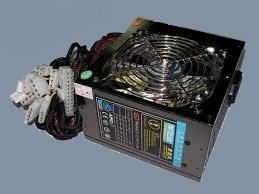


© Estwald ISI 2015 - 2025


Estwald’s
Information System Infrastructures

Power Supply
The power supply unit (PSU) converts line voltage to 3vdc, 5vdc, and 12vdc for use
by the system. They are rated in watts (W), a unit of power, and can run from as little as
200W and up to 1600W. Their physical shape varies to accommodate rack and free
standing cases and the number and type of power connectors provided varies as does the
length of each cable type. Most have universal 100VAC -240VAC inputs although cheaper
units may employ a switch.
For decades power supplies have been about 75% efficient. This means that for
every watt that a power supply consumed 75% of the line power was converted to DC
power for use by the system. The remaining 25% was wasted, generally as heat. In the
last few years a push to increase efficiencies has resulted in a program known as 80 PLUS.
Participating manufacturers may label their units as such if they pass a given level of efficiency. The levels are provided in the
table below:
Level Efficiency @ Percent of Rated Power
10% 20% 50% 100%
80 Plus 80% 80% 80%
80 Plus Bronze 82% 85% 82%
80 Plus Silver 85% 88% 85%
80 Plus Gold 87% 90% 87%
80 Plus Platinum 90% 92% 89% 80%
80 Plus Titanium 90% 92% 94% 90%
To explain the table let’s assume a system needs 300W and the power supply is rated for 600W and has an efficiency
rating of 80 Plus Titanium. The PSU is operating at 50% of its rated output and the efficiency is 94%. That means the power
being drawn from the AC outlet is about 319W. A non 80 Plus PSU would pull about 400W.
Of course this efficiency comes at a cost particularly when Platinum and Titanium levels are used and for the casual home
user the return-on-investment (ROI) would take years. But for SMBs running multiple systems 8 to 24 hours/day the savings in
electricity not only from the system’s electricity use but also from air conditioning costs could provide an ROI in a few months.
Also note that sizing the PSU to operate between 40% and 60% of its rated power provides the greatest efficiency. Care
should be taken to work out a computer’s power requirements prior to selecting a PSU. The benefits are not only in electricity
use but also in the longevity of PSU that is operating optimally.
















